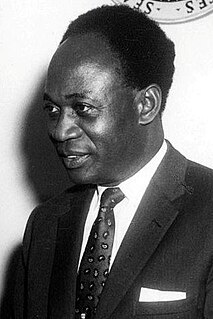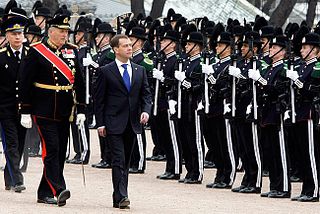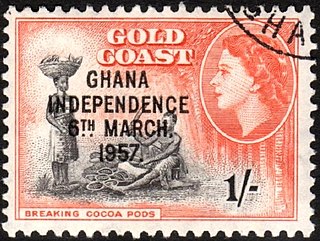
The Ghana Armed Forces (GAF) is the unified armed force of Ghana, consisting of the Army (GA), Navy (GN), and Ghana Air Force.

Kwame Nkrumah was a Ghanaian politician and revolutionary. He was the first Prime Minister and President of Ghana, having led the Gold Coast to independence from Britain in 1957. An influential advocate of pan-Africanism, Nkrumah was a founding member of the Organization of African Unity and winner of the Lenin Peace Prize from the Soviet Union in 1962.

In some militaries, foot guards are senior infantry regiments. Foot guards are commonly responsible for guarding royal families or other state leaders, and they also often perform ceremonial duties accordingly, but at the same time are combat soldiers.

Household Division is a term used principally in the Commonwealth of Nations to describe a country's most elite or historically senior military units, or those military units that provide ceremonial or protective functions associated directly with the head of state.

The Ghana Air Force (GHF) is the aerial warfare organizational military branch of the Ghanaian Armed Forces (GAF). The GHF, along with the Ghanaian army (GA) and Ghanaian navy (GN), make up the Ghanaian Armed Forces (GAF) which are controlled by the Ghanaian Ministry of Defence (MoD).

Joseph Arthur Ankrah was a General of the army of Ghana who served as the 2nd President of Ghana from 1966 to 1969 in the position of Chairman of the National Liberation Council. Ankrah also served as Chairperson of the Organisation of African Unity from 24 February 1966 to 5 November 1966. Before becoming the Head of State, Ankrah served as the first commander of the Ghana Army.
The Ghana Regiment is an infantry regiment that forms the main fighting element of the Ghanaian Army (GA).
The United Gold Coast Convention (UGCC) was a political party whose aim was to bring about Ghanaian independence from their British colonial masters after the Second World War. The United Gold Coast Convention appointed its leaders to include Kwame Nkrumah, who was the Secretary General. However, upon an aligation for plans against Nkrumah's leadership, he was arrested and jailed. The UGCC leadership broke up and Kwame Nkrumah went on a separate way to set up the Convention People's Party (CPP) for the purpose of self-governance.

A guard of honour (GB), also honor guard (US), also ceremonial guard, is a guard, usually military in nature, appointed to receive or guard a head of state or other dignitaries, the fallen in war, or to attend at state ceremonials, especially funerals. In military weddings, especially those of commissioned officers, a guard, composed usually of service members of the same branch, form the Saber arch. In principle any military unit could act as a guard of honour. However, in some countries certain units are specially designated to serve as a guard of honour, as well as other public duties.

John Ebenezer Samuel de Graft-Hayford (1912–2002) was Ghana's first Ghanaian Chief of Air Staff. He became the first indigenous Air Force Commander in Ghana and Black Sub-Saharan Africa. He was also acting Chief of Defence Staff (CDS) for a brief period in 1962.

The Ghana Army (GA) is the main ground warfare organizational military branch of the Ghanaian Armed Forces (GAF). In 1959, two years after the Gold Coast obtained independence as Ghana, the Gold Coast Regiment was withdrawn from the Royal West African Frontier Force, and formed the basis for the new Ghanaian army. Together with the Ghanaian air force (GHF) and Ghanaian navy (GN), the Ghanaian army (GA) makes up the Ghanaian Armed Forces (GAF), controlled by the Ghanaian Ministry of Defence (MoD) and Central Defence Headquarters, both located in Greater Accra.

Major General Emmanuel Kwasi Kotoka was a member of the ruling National Liberation Council which came to power in Ghana in a military coup d'état on 24 February 1966. This overthrew the government of Dr. Kwame Nkrumah, the first president of the republic.
Lieutenant General Albert Kwesi Ocran was a soldier and politician. He was a member of the Presidential Commission of Ghana between 1969 and 1970. He is a former Chief of the Defence Staff of the Ghana Armed Forces and was a member of the National Liberation Council (NLC) military government in Ghana.

The Ghana Navy (GN) is the naval warfare organizational military branch of the Ghanaian Armed Forces (GAF). The Ghanaian Navy, along with the Ghanaian Army (GA) and Ghanaian Air Force (GHF), make up the Ghanaian Armed Forces (GAF) which are controlled by the Ghanaian Ministry of Defence (MoD).

Ghana gained independence from the British on 6 March 1957. It is a member of the Commonwealth of Nations. The country became a republic on July 1, 1960.
The Ghana Institute of Journalism is a public university in Ghana. The institute has accreditation from the National Accreditation Board.
Salifu Dagarti was a British trained Ghanaian police officer and presidential bodyguard who shielded Kwame Nkrumah with his body on the fifth attempt to assassinate Nkrumah since he came to power in 1957.
Brigadier Joseph Edward Michel was a Ghanaian soldier. He was one of the early commissioned officers in the Ghana Army.
Michel Camp is the base of the First Battalion of Infantry of the Ghana Army. It is located at Tema in the Greater Accra Region of Ghana. The First Battalion together with the Second and Fifth Battalions of Infantry make up the Southern Command of the Ghana Army.

The Kulungugu bomb attack was a failed assassination attempt on Kwame Nkrumah, the President of Ghana.












